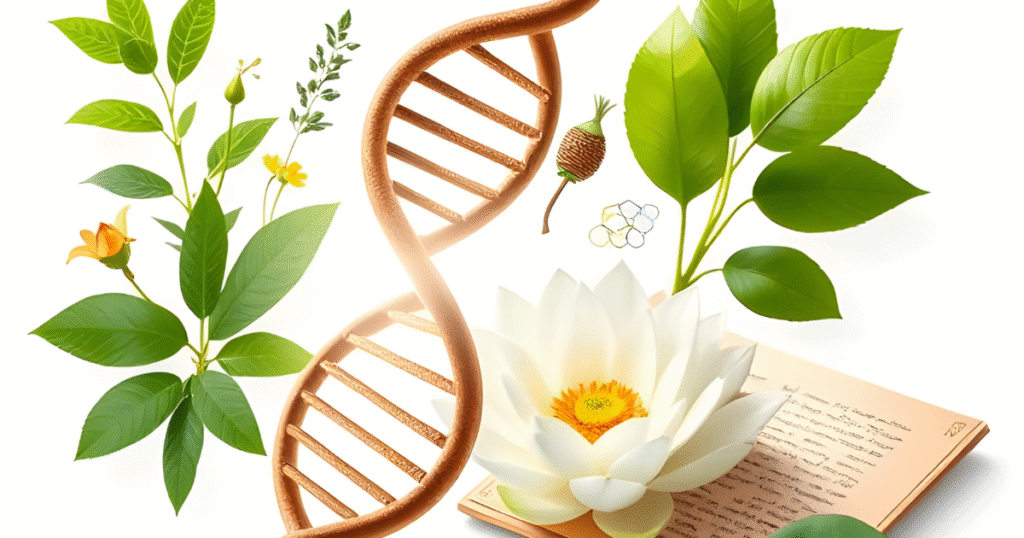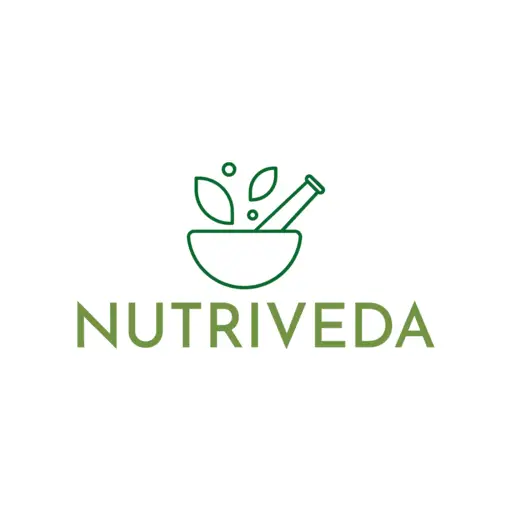What if your lunch could talk to your DNA?
Imagine combining your genes with your doshas to craft a diet that actually works for you, not for someone else on Instagram.
Ayurveda has always believed that food is medicine, it’s one of the trayoupasthamba (three fundamental aspects of life), but what if we could make it even more personal, down to our very DNA?
Welcome to the world of Ayurnutrigenomics—a powerful intersection where ancient Ayurvedic principles meet cutting-edge genetic science. It’s where your Prakriti meets your genetic code, and together, they help shape a diet that’s tailor-made just for you.
This isn’t futuristic wellness. It’s happening now—and it’s especially relevant for people seeking holistic, personalized, and preventive health solutions.
Table of Contents
What You’ll Learn in This Part
Here’s a quick rundown of what we’ll cover:
- What Ayurnutrigenomics really means
- How your Prakriti (body constitution) connects with your genes
- The basics of nutrigenomics
- How Ayurveda views food, digestion, and balance
- The concept of Ayurgenomics and its growing role in modern medicine
Let’s get into it.
Introduction: Ancient Roots, Genetic Wings
I remember learning about Prakriti assessment in college—the idea that each person is born with a unique constitution made up of Vata, Pitta, and Kapha. At the time, it felt deeply personal and logical. Fast forward to today, science has finally caught up.
Enter Ayurnutrigenomics—a term that might sound like a mouthful but really just means this:
Using your unique Ayurvedic body type and your genetic makeup to create a diet that helps you thrive.
In times like these, when lifestyle diseases like diabetes, obesity, and PCOS are rising fast, this approach holds immense promise. It bridges the wisdom of Ayurveda with the precision of modern biology, making our health strategies smarter—and more saatvik.
Quick Takeaways (For the Skimmers)
Here’s a bullet list of why Ayurnutrigenomics matters:
- It’s personalized: Based on your Prakriti and genes. No one-size-fits-all diet here.
- It’s preventive: It helps avoid diseases before they start.
- It’s natural: Aligns with Ayurvedic nutrition—food as medicine.
- It’s innovative: Think functional foods and nutraceuticals made for you.
- It’s relevant: Especially for people navigating between traditional wellness and modern science.
What is Ayurnutrigenomics?
Let me simplify it:
Ayurnutrigenomics = Ayurveda + Nutrigenomics
It’s the study of how your Ayurvedic constitution interacts with your genetic profile, particularly how diet influences that interaction.
In Ayurveda, we already use Prakriti to guide dietary recommendations. What Ayurnutrigenomics does is validate and refine this wisdom using modern genetic tools.
Imagine a diet plan that not only balances your Doshas but also accounts for your risk of diabetes based on your genes. That’s the power of this fusion.
What is Nutrigenomics?
Think of nutrigenomics as the modern cousin of Ayurvedic dietetics. It studies how:
- Nutrients affect your genes
- Your genes influence how you metabolize nutrients
For example, some people carry a gene variant that makes it hard to digest lactose. Nutrigenomics can identify this and recommend avoiding dairy, something Ayurveda might already suggest for certain Pitta types.
So, it’s not just about calories or carbs. It’s about how your body responds to food at the cellular level.
Ayurveda’s Take on Nutrition
In Ayurveda, food isn’t just fuel—it’s Mahabhaisajya (the great medicine). Here are a few pillars of Ayurvedic nutrition:
- Agni (digestive fire) is everything. Weak digestion leads to Ama (toxins) and disease.
- Food should match your Dosha. Vata types need warm, grounding foods. Pitta types benefit from cooling, less spicy meals. Kapha types? Light and dry foods work best.
- Ritu (seasonal) and Desha (geographical) factors matter. What you eat should change with the weather and location.
Where modern nutrition talks about macros and micros, Ayurveda goes deeper into energetics, gunas, and digestibility.
Ayurgenomics: A Step Beyond

While Ayurnutrigenomics focuses on nutrition, Ayurgenomics is the broader field where Ayurveda meets genomics to understand disease, drug response, and more.
Here’s what makes Ayurgenomics unique:
- Uses Prakriti to stratify people into genetic subgroups
- Helps identify disease risk before symptoms appear
- Useful in drug discovery and personalized treatment protocols
In India, the CSIR and CCMB have already done studies showing how Prakriti types correlate with gene expression, immune responses, and even lifestyle disorders.
Ayurnutrigenomics vs Nutrigenomics vs Ayurgenomics
| Concept | Focus Area | Based On | Goal |
|---|---|---|---|
| Ayurnutrigenomics | Diet & nutrition | Prakriti + Genes | Personalized food plans |
| Nutrigenomics | Nutrient-gene interaction | Genes | Disease prevention via diet |
| Ayurgenomics | Medicine & treatment | Prakriti + Genes | Personalized medical interventions |
Where Ayurnutrigenomics Actually Shows Up in Real Life
Let’s move beyond theory — where does this really show up in everyday life?
Here’s how Ayurnutrigenomics is starting to make its mark:
Personalized Diet Plans (Your Genes + Your Prakriti)
Forget generic meal plans. Imagine eating based on:
- Your DNA — what your body responds to well
- Your Prakriti — Vata, Pitta, or Kapha balance
For example:
- A Kapha-Predominant person with a genetic tendency for insulin resistance? A light, spicy, low-carb diet would be ideal.
- A Pitta person with inflammation markers? Cooling foods like coriander, aloe vera juice, and ghee might be recommended.
This is where the science meets the sambar.
Functional Foods & Nutraceuticals
Think of these as supercharged food items:
- Ashwagandha capsules for stress-prone Vata types
- Triphala-infused green tea for sluggish digestion
- Gene-specific herbal ghee for better metabolism
We’re talking about Ayurvedic superfoods, but upgraded with DNA data. Brands are beginning to explore these, especially in India’s emerging wellness-tech space.
Preventive Healthcare Programs
Ayurnutrigenomics can be used for:
- Diabetes prevention plans
- Gut health optimization
- Skin and hair wellness routines
Hospitals and integrative clinics (especially in cities like Bengaluru, Pune, and Delhi) are piloting this approach with good feedback so far.
Why Ayurnutrigenomics Matters (Big Time)
So what’s all the buzz about? Here’s what makes this fusion powerful:
Top Benefits at a Glance
| Benefit | How it Helps You |
|---|---|
| Disease Prevention | You eat in a way that reduces your genetic health risks |
| Better Digestion | Based on your Agni (digestive fire) & genetic enzyme efficiency |
| Metabolic Support | Supports weight, blood sugar, and energy regulation |
| Personal Relevance | No more “one-size-fits-all” diets |
| Holistic Harmony | Aligns body, mind, and genes with nature’s rhythm |
Imagine your body finally saying, “Hey, this is exactly what I needed.”
The Roadblocks (And Why They Matter)
Of course, it’s not all smooth sailing. Let’s keep it real:
Standardization Issues
- Prakriti assessment varies wildly between practitioners.
- Genetic data without Ayurvedic interpretation is often useless in this model.
Research Gaps
- More clinical trials are needed to confirm the efficacy of this fusion.
- Integration into the medical curriculum or AYUSH guidelines is still very new.
Ethical Concerns
- Genetic data is sensitive. Who owns it? How’s it stored?
- Ayurveda promotes balance and trust — the tech side must align with that value.
What’s Next for Ayurnutrigenomics?
You know that feeling when something just clicks? Ayurnutrigenomics could be that moment for modern Ayurveda. Here’s what the future might look like:
What’s Coming Up
- Mainstream adoption: Ayurvedic wellness apps and clinics offering DNA-based diet plans.
- Functional food research: Development of gene-targeted Ayurvedic snacks, herbal drinks, and supplements.
- Public health use: Integration into national wellness initiatives like Ayushman Bharat or Fit India.
Frequently Asked Questions (FAQs)
Q1. What is Ayurnutrigenomics in simple words?
It’s the marriage of Ayurveda and gene science — your body’s constitution (Prakriti) meets your DNA to help you eat smarter and live healthier.
Q2. What’s the difference between Ayurgenomics and Ayurnutrigenomics?
Ayurgenomics focuses on your genes + Prakriti for disease understanding. Ayurnutrigenomics uses that combo specifically for personalized diet and nutrition.
Q3. Isn’t Ayurveda already personalized? Why add genomics?
Good point! Ayurveda is naturally individualized, but genomics offers a new dimension. Think of it as adding a telescope to a sharp pair of eyes.
Q4. Is this available in India yet?
Yes! Companies like MapmyGenome and Xcode Life are already offering gene testing, and some Ayurveda wellness clinics are combining it with diet protocols.
Wrapping It All Up
Ayurnutrigenomics isn’t just a buzzword — it’s a bridge. A bridge between the ancient and the cutting-edge, between tradition and technology, between what your genes need and what your doshas demand.
If you’re someone who wants to truly understand your body, not just superficially, but deeply, then this is a journey worth taking.
I’ll leave you with this:
“When food is wrong, medicine is of no use. When food is right, medicine is not needed.” – Ayurvedic Proverb
References
- Ayurnutrigenomics: Ayurveda-Inspired Personalized Nutrition from Inception to Evidence
Banerjee S., Debnath P., Debnath P.K.
Journal of Traditional and Complementary Medicine, 2015; 5(4): 228–233. - Ayurgenomics: A New Way of Threading Molecular Variability for Stratified Medicine
Sethi T.P., Prasher B., Mukerji M.
ACS Chemical Biology, 2011; 6(9): 875–880. - Ayurnutrigenomics: Traditional Knowledge-Inspired Approach Toward Personalized Nutrition
Banerjee S., Debnath P., Debnath P.K.
Clinical Aspects of Functional Foods and Nutraceuticals (pp.423-444), September 2014 - Ayurnutrigenomics – A Step Towards Personalized Nutrition
Dr. M.C. Shobhana, Dr. Litty V. Raju
Indian Journal of Applied Research, 2022; 12(1). - Ayurgenomics for Stratified Medicine: TRISUTRA Consortium Initiative Across Ethnically and Geographically Diverse Indian Populations
Prasher B., Varma B., Kumar A., et al.
Journal of Ethnopharmacology, 2017; 197: 274–293.




